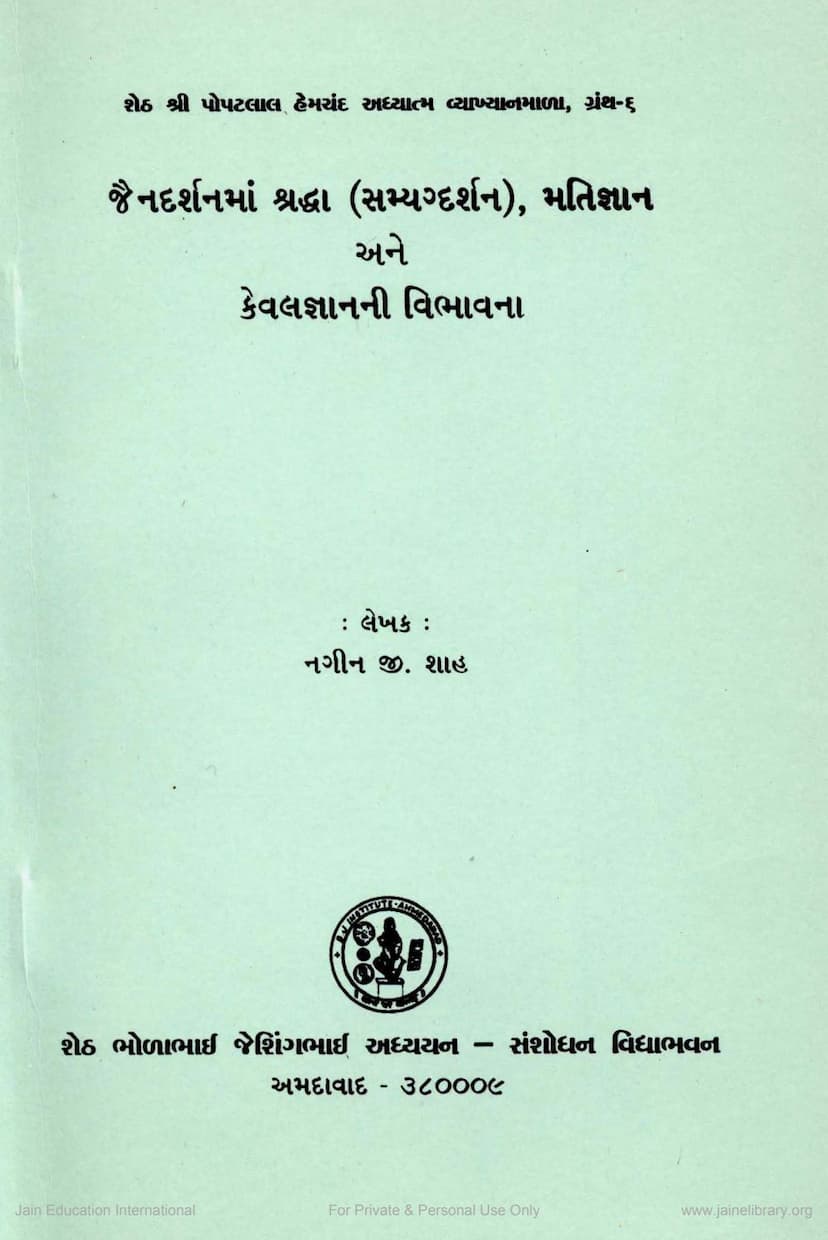Jain Darshanma Shraddha Matigyan Ane Kevalgyanni Vibhavana
Added to library: September 1, 2025

Summary
This document summarizes a book titled "Jain Darshanma Shraddha Matigyan ane Kevalgyanni Vibhavana" (The Concept of Faith (Samyagdarshana), Matijñāna, and Kevalajñāna in Jainism) by Dr. Nagin J. Shah. Published by Bholabhai Jesingbhai Adhyayan Sanshodhan Vidyabhavan, Ahmedabad, in 2000, the book is based on three lectures delivered by the author.
The book critically examines three key concepts in Jain philosophy:
1. Shraddha (Samyagdarshana) - Faith/Right Faith:
- The first lecture defines Samyagdarshana in Jainism, which is essentially unwavering faith in the true nature of reality as presented by Jain teachings, particularly the seven tattvas (soul, non-soul, influx, bondage, stoppage, liberation, and liberation itself).
- It emphasizes the necessity of studying other philosophical traditions (like the Upanishadic and Buddhist) to fully grasp the Jain concept of faith.
- The lecture draws parallels between the four spiritual steps outlined in the Upanishads (Darshana, Shravana, Manana, Nididhyasana) and the Jain path, particularly the Ratnatrayi (three jewels: Right Faith, Right Knowledge, and Right Conduct).
- It highlights the Buddhist understanding of faith (Saddha), viewing it as purification of the mind, freedom from attachment to preconceptions, and a preparatory stage for listening (Shravana).
- The author argues that Jainism's Samyagdarshana (faith) can be understood as having two stages: a natural, innate inclination towards truth (pre-Shravana) and a faith based on listening and understanding the teachings (post-Shravana).
- The five signs of true faith are discussed: suppression of passions (prashama), yearning for truth (samvega), detachment from worldly affairs (nirveda), compassion (anukampa), and openness to truth (astikya).
2. Matijñāna - Sensory/Mental Cognition:
- The second lecture focuses on Matijñāna, defining it as the initial stage of cognition that arises from sensory perception and mental processing.
- It connects the Jain jñānapanchaka (five types of knowledge: mati, shruta, avadhi, manahparyaya, kevala) with the four Upanishadic spiritual steps, suggesting that Shravana (listening) corresponds to Shruta, and Manana (reflection) corresponds to Mati.
- The author critiques the Jain logical framework's redefinition of "Manana" (reflection) as "Mati" and its inclusion of various cognitive processes like sensory perception, memory, recognition, reasoning, and inference under Matijñāna.
- The text analyzes the Jain classification of Matijñāna into types like indriyapratyaksha (sensory perception), smriti (memory), pratyabhijna (recognition), tark (reasoning), and anumana (inference), questioning the rationale behind grouping such distinct cognitive faculties under one category.
- It points out the perceived inconsistency in Jain logic, particularly how the stages of Manana (avagraha, iha, avaya, dharana) are applied to sensory perception but not to other forms of cognition.
- The author suggests that Matijñāna, as understood in Jainism, is fundamentally the intellectual process of "Manana" from the Upanishadic tradition.
3. Kevalajñāna - Omniscience/Absolute Knowledge:
- The third lecture delves into Kevalajñāna, Jainism's concept of absolute and perfect knowledge, which is equated with omniscience.
- It examines the arguments presented by Jain logicians to establish omniscience, including the idea that knowledge, like quantity, is graded and must reach a perfect state.
- The author critically analyzes these arguments, deeming them flawed. For instance, he points out that the analogy of "quantity" reaching perfection doesn't necessarily apply to knowledge.
- A significant critique is that equating Kevalajñāna with omniscience (knowing all objects and their states across past, present, and future) leads to an inadvertent acceptance of extreme determinism, which contradicts the Jain doctrine of karma and individual effort.
- The book argues that the concept of omniscience leads to logical inconsistencies and difficulties, such as the paradox of the omniscient being having to experience all unpleasant states.
- It proposes that the "omniscience" attributed to Kevalajñāna might be a later imposition influenced by societal and religious trends.
- The author suggests that "Kevalajñāna" could more accurately be understood as pure, uncontaminated knowledge, free from attachment and aversion (Vitaraga's knowledge), or simply as self-knowledge (Atma-jñāna), aligning more closely with Upanishadic thought.
- The text criticizes the inclusion of mundane knowledge (astronomy, geography) attributed to Mahavira due to the concept of omniscience, arguing that this undermines his core message of spiritual liberation and can create skepticism among younger generations due to conflicts with modern science.
- It suggests that the essence of Kevalajñāna lies in internal purity and spiritual realization rather than the quantity of knowledge acquired.
In essence, the book by Dr. Nagin J. Shah offers a critical and comparative analysis of fundamental Jain epistemological and spiritual concepts, placing them within the broader context of Indian philosophical thought. It aims to clarify the original meanings and evolution of these concepts, highlighting potential inconsistencies and offering alternative interpretations.